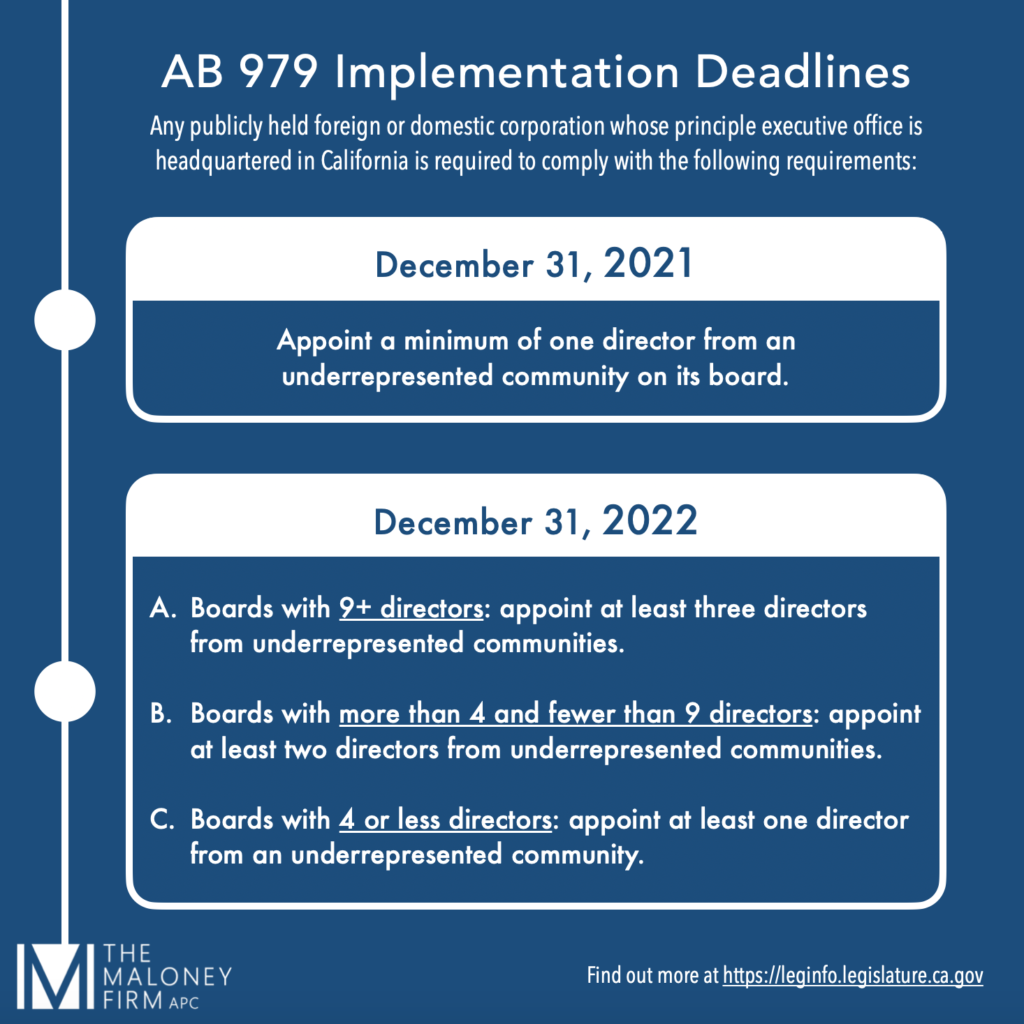California Enacts Mandated Diversity Quotas for Corporate Boards
Oct 05, 2020
On September 30, Governor Newsom signed Assembly Bill (AB) 979, which establishes groundbreaking diversity quotas for the corporate boards of publicly traded companies headquartered in California. Find out more about how AB 979 affects California businesses below.
.
Brief History of AB 979
.
In spite of widespread corporate interest in promoting diversity and inclusion in the workplace, the boards of most Fortune 500 companies remain unrepresentative of the diversity of the California workforce. A recent study conducted by Forbes and Ropes & Gray found that out of 5,670 board positions in Fortune 500 companies, only 24 are occupied by individuals who openly identify as LGBTQ+.[1] Deloitte’s 2018 “Missing Pieces Report” found that just 16% of Fortune 500 board members are people of color.[2]
.
In 2018, California lawmakers created a quota for female board members by passing Senate Bill (SB) 826. This bill is credited with accelerating the inclusion of women in white collar industries, as well as setting a far-reaching example for responsible business practices. It is also heavily criticized as potentially unconstitutional, and, along with AB 979, faces opposition in court.
.
Citing concerns about “racial injustice and inequity in our society,” Assemblyman Chris Holden (D-Pasadena) modeled AB 979’s requirements after SB 826 in order to expedite the diversification of California’s white collar workforce. “While some corporations were already leading the way to combat implicit bias, now, all of California’s corporate boards will better reflect the diversity of our state. This is a win-win as ethnically diverse boards have shown to outperform those that lack diversity.”
.
Employer Requirements under AB 979
.
AB 979 requires any publicly held foreign or domestic corporation whose principle executive office is headquartered in California to comply with the following requirements:
.
- 1. No later than the close of the 2021 calendar year, the corporation must have a minimum of one director from an underrepresented community; and
- 2. No later than the close of the 2022 calendar year, corporations with nine or more directors must have a minimum of three directors from underrepresented communities, corporations with more than four but fewer than nine directors must have a minimum of two directors from underrepresented communities, and corporations with four or fewer directors must have a minimum of one director from an underrepresented community.
.

.
In the context of AB 979, a director from an “underrepresented community” refers to individuals who self-identify as Black, African American, Hispanic, Latino, Asian, Pacific Islander, Native American, Native Hawaiian, or Alaska Native, or as gay, lesbian, bisexual, or transgender.
.
No later than March 1, 2022, California’s Secretary of State will begin to publish annual reports documenting compliance with the bill’s diversification requirements. Under AB 979, the Secretary of State is authorized to fine corporations between $100,000 and $300,000 for failing to comply with the bill’s requirements or for failing to file board member information in a timely manner.
.
Resources for California Employers
.
Find the full text of Assembly Bill (AB) 979 here.
.
Find the full text of Senate Bill (SB) 826 here.
.
If you have questions regarding the application of AB 979 to your business, please contact one of the following attorneys in The Maloney Firm’s Employment Law Department: Patrick Maloney, Lisa Von Eschen, Samantha Botros, or Nicholas Grether.
[1] https://www.forbes.com/sites/toddgsears/2020/09/30/all-eyes-on-california-this-wednesday-ab-979-could-alter-corporate-boards-for-the-better/#1ece4f9695a4
[2] https://www2.deloitte.com/us/en/pages/center-for-board-effectiveness/articles/missing-pieces-fortune-500-board-diversity-study-2018.html



